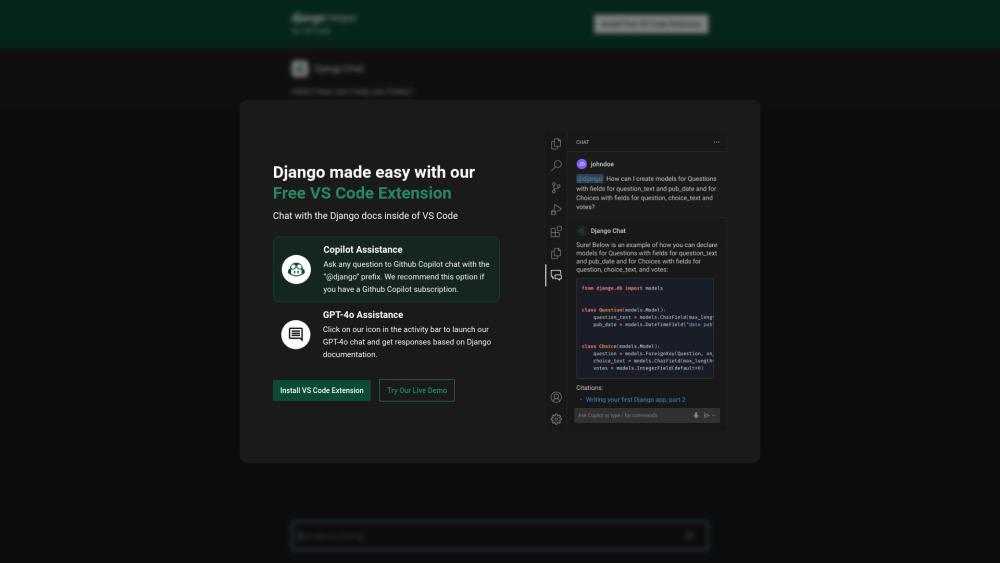Django Helper
Django Helper is a development tool that provides helper functions, middleware, and utilities to make Django application development easier and more efficient.
https://www.djangohelper.com/

Product Information
Updated:Nov 9, 2024
What is Django Helper
Django Helper is a collection of common utilities, helper functions, and development tools designed specifically for Django web applications. It includes various components like middleware, session managers, custom database fields, template tags, and other helper utilities that developers frequently need when building Django projects. The tool aims to reduce code repetition and provide ready-to-use solutions for common Django development tasks.
Key Features of Django Helper
Django Helper is a comprehensive toolkit that provides various utility functions, helper classes, and middleware components to streamline Django application development. It offers features like JSON response handling, user tracking, authentication decorators, encrypted fields, and various helper functions that can be organized in separate files or packages to maintain clean code structure.
Helper Function Organization: Allows developers to organize utility functions in separate files (like utils.py, services.py) or custom packages to maintain clean and modular code structure
Authentication Helpers: Provides decorators like @anonymous_required and user management utilities to handle authentication workflows more efficiently
Response Handlers: Includes specialized response classes like JsonResponse and XMLResponse for handling different types of API responses
Model Helpers: Offers utilities for working with Django models, including encrypted fields and cached properties to enhance model functionality
Use Cases of Django Helper
API Development: Simplifies building REST APIs by providing JSON response handling and middleware utilities
User Management Systems: Facilitates user authentication and tracking features for applications requiring user management
Data Processing Applications: Helps in building applications that require complex data processing with model helpers and utility functions
Pros
Reduces boilerplate code and increases development efficiency
Provides organized structure for common Django functionalities
Compatible with different Django versions and offers good documentation
Cons
May add unnecessary complexity for simple projects
Version compatibility issues with older Django versions
How to Use Django Helper
Create a helper/utils file: Create a utils.py or helpers.py file inside your Django app directory to store helper functions
Define helper functions: Write your helper functions in the utils.py/helpers.py file that you want to use across your Django app
Import helpers: Import your helper functions in views or other files using: from myapp.utils import my_helper_function
Use django-app-helper (optional): Install django-app-helper if you need additional helper functionality for development and testing
Configure django-app-helper: Run django-app-helper commands from your project root directory containing setup.py
Organize helpers by scope: Place app-specific helpers in the related app folder, and create a common/global helpers directory for project-wide utilities
Test helper functions: Write tests for your helper functions to ensure they work as expected
Use Github Copilot integration: If using VS Code, you can ask Django-related questions using @django prefix in Github Copilot chat
Django Helper FAQs
There are several common places to put helper functions: 1) Create a utils.py file in your app folder, 2) Create a service.py file in your app folder, or 3) Create a dedicated folder inside your Django application for global helper functions and constants.











